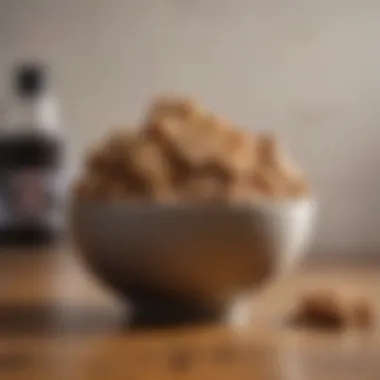Dietary Remedies for Dogs with Diarrhea: What to Give


Intro
When a dog suffers from diarrhea, it can be concerning for any pet owner. Understanding what can be done to alleviate this condition is crucial. This article provides insight into dietary adjustments, home remedies, and when it is essential to consult a veterinarian. By being informed, you can take appropriate measures to ensure your pet's well-being during distressing times.
Understanding Your Pet
Breed Traits
Different breeds may react to dietary changes in various ways. For instance, smaller breeds might experience digestive issues more often than larger breeds. Understanding your dog's specific breed can help tailor remedies that best suit their needs.
Common Temperaments
The temperament of your dog can influence their recovery. Anxiety or stress can exacerbate gastrointestinal issues. Observing behavioral changes becomes essential, as certain dogs may show signs of discomfort or distress during episodes of diarrhea.
Special Needs
Some dogs have special dietary requirements due to existing health conditions. Older dogs, for example, may need a gentler diet. It is vital to consider these needs when choosing remedies for diarrhea.
Dietary Adjustments
Suitable Foods
When dealing with diarrhea, simple, easily digestible foods are recommended. Options include:
- Boiled chicken (no skin or bones)
- Plain white rice
- Sweet potatoes (cooked and mashed) These foods provide essential nutrients while being gentle on the stomach.
Hydration
It is crucial to maintain hydration. Diarrhea can lead to dehydration. Always provide fresh water, and consider offering an electrolyte solution formulated for pets.
Probiotics
Probiotics can aid in restoring the natural gut flora. Products like FortiFlora can be beneficial. They help in re-establishing balance after digestive upset.
Always consult with a veterinarian before introducing new supplements or diets.
Home Treatments
Fasting
Giving your dog a short fasting period, about 12-24 hours, can help reset the digestive system. This period allows the gastrointestinal tract to rest.
Gradual Reintroduction
After fasting, gradually reintroduce food. Start with small portions of the recommended bland diets mentioned above. Monitor your dog's response closely.
Monitoring Health
Keeping an eye on your dog's condition is vital. If diarrhea persists for more than 24 hours, or if you notice blood, lethargy, or vomiting, contact a veterinarian immediately. These may indicate serious underlying issues.
When to Seek Veterinary Help
If you observe any symptoms like dehydration, lethargy, or refusal to eat, prompt veterinary consultation is imperative. Always err on the side of caution when it comes to your pet's health.
Finale
Dealing with a dog's diarrhea can be challenging. However, knowing the right steps to take can ease the process. From dietary adjustments to understanding when to consult a veterinarian, being informed can empower you as a pet owner. Take action to safeguard your pet's health, ensuring their comfort during recovery.
Preface to Canine Diarrhea
Understanding and managing canine diarrhea is essential for every dog owner. It serves as a crucial aspect of maintaining your dog's health. Diarrhea can signify a range of issues from mild indigestion to serious health concerns. Knowing how to respond effectively can reduce your dog's discomfort and prevent further complications.


Understanding Diarrhea in Dogs
Diarrhea in dogs is often characterized by unusually loose or watery stools. This condition can arise from various factors affecting a dog’s digestive system. The significance of recognizing diarrhea early cannot be overstated. It can lead to dehydration and can elevate underlying health issues, particularly if persistent. Owners should monitor their dogs closely when they notice changes in stool consistency and frequency.
Several elements can impact a dog's digestive health. Stress, dietary indiscretions, and sudden changes in food are common triggers. If a dog experiences diarrhea for a short duration, it might not be alarming. However, prolonged episodes warrant immediate attention. Educating pet owners about these signs empowers them to make informed decisions.
Potential Causes of Diarrhea
Diarrhea can emerge from numerous sources. Identifying these cause is vital for effective treatment. Common causes include:
- Dietary Changes: Switching dog food abruptly can irritate the stomach and intestines.
- Food Intolerance: Some dogs may have sensitivities to certain ingredients.
- Infections: Bacterial, viral, or parasitic infections can lead to diarrhea.
- Toxins: Ingesting harmful substances or spoiled food poses risks.
- Underlying Health Conditions: Diseases such as pancreatitis or liver issues can manifest as diarrhea.
Recognizing Symptoms of Diarrhea
Recognizing symptoms of diarrhea in dogs is essential for prompt treatment and recovery. Diarrhea is not just a mild nuisance but can lead to serious health issues if unevaluated and untreated. Monitoring your dog's health closely can help you identify not only the presence of diarrhea but also its underlying causes. With knowledge of symptoms and their significance, pet owners can make informed decisions about when to attempt home remedy solutions or when additional veterinary care is necessary.
Identifying Types of Diarrhea
Diarrhea in dogs can manifest in various forms. Understanding the different types can assist in determining the severity and potential causes. Common classifications include:
- Acute Diarrhea: This type appears suddenly and usually resolves quickly, often linked to dietary changes or minor infections.
- Chronic Diarrhea: This extends over a longer period, often indicating an underlying health issue.
- Soft stools: Indicate mild gastrointestinal distress, often related to recent diet changes or stress.
- Liquid diarrhea: Often a sign of serious digestive upset or infection.
- Dysentery: Characterized by the presence of blood or mucus, requiring immediate veterinary care.
Each type provides crucial information about your dog's condition, highlighting the significance of accurate identification in guiding treatment decisions.
When to Seek Veterinary Care
Although some instances of diarrhea can be managed at home, there are critical signs that warrant urgent veterinary attention. Key indicators that your dog should see a veterinarian include:
- Severe Dehydration: Check for symptoms such as dry gums, sunken eyes, or lethargy.
- Presence of Blood: Any indication of blood, be it bright red or dark, should signal a veterinary consultation.
- Persistent Vomiting: If vomiting accompanies diarrhea, this could exacerbate dehydration risks.
- Prolonged Diarrhea: Lasting more than 24 hours without improvement calls for professional intervention.
- Underlying Health Issues: Dogs with existing health problems or those who are very young or elderly need immediate attention.
Seeking veterinary help in these conditions can effectively prevent potential complications and ensure your dog's health remains a priority.
Overall, being vigilant about your dog's symptoms creates a more effective treatment plan. Understanding the types of diarrhea and recognizing when to seek help can provide peace of mind and significantly aid recovery.
Home Remedies for Dog Diarrhea
Home remedies for dog diarrhea can play a crucial role in managing your pet's condition. While occasional diarrhea is common in dogs, it can lead to dehydration and other health issues if not addressed properly. This article will explore various remedies that can be utilized at home to ease your dog's discomfort. They include dietary adjustments, over-the-counter solutions, and general care strategies.
Dietary Adjustments to Consider
The food your dog consumes is fundamental in addressing diarrhea. Adjusting the diet can help stabilize digestion. Consider following these points:
- Bland Diet: Often recommended for dogs with diarrhea, a bland diet includes easy-to-digest foods. Chicken breast and rice are two popular options. This simplifies digestion and provides necessary nutrients without adding stress to the digestive system.
- Small, Frequent Meals: Instead of feeding your dog one or two large meals a day, opt for smaller, more frequent meals. This can reduce the burden on their digestive system, supporting gradual recovery.
- Avoid Dairy Products: Some dogs are lactose intolerant, and dairy can exacerbate diarrhea. Water and clear broths are better alternatives for hydration.
- Incorporate Fiber: Adding sources of fiber, such as canned pumpkin (not pumpkin pie filling), can help firm up the stool. Fiber aids digestion and improves bowel health.
Over-the-Counter Solutions
If dietary adjustments alone do not yield improvement, over-the-counter solutions may offer some assistance. Always consult your vet before introducing new products. Here are some options to consider:
- Probiotic Supplements: Probiotics can help restore the natural balance of bacteria in the gut. They are available in various forms and can enhance your dog’s digestive health.
- Anti-Diarrheal Medications: Some medications designed specifically for dogs can help manage diarrhea. Check with your veterinarian for recommendations and proper dosing. Medications like Kaopectate and Pepto-Bismol are sometimes used but must be given cautiously.
- Hydration Solutions: Products like electrolyte solutions are available specifically for pets. These help replace lost fluids and prevent dehydration.
Remember that not all products marketed for human use are safe for dogs. Always read labels and consult veterinary professionals when in doubt.
Home remedies can provide immediate relief but should not replace veterinary care if symptoms persist. Keeping a close eye on your dog's overall condition is essential.
Recommended Foods for Diarrhea Management
The management of diarrhea in dogs often hinges on specific dietary choices. Understanding which foods can support gastrointestinal recovery is crucial for pet owners. Proper nutrition can help soothe the digestive tract and restore balance. In this section, we will discuss the benefits of selected foods and how they play a role in managing diarrhea effectively.
Bland Diet Options
When a dog experiences diarrhea, introducing a bland diet is a common recommendation. The goal is to ease the strain on the digestive system while providing essential nutrients. Bland diet options usually consist of easily digestible ingredients that can provide comfort and stability. Highly regarded choices include:


- Boiled rice: A staple in any bland diet due to its digestibility. Rice is low in fiber and can absorb excess fluid in the intestines.
- Boiled chicken: Skinless and boneless chicken offers protein without overwhelming the stomach. It should be properly cooked without any seasonings.
- Plain pumpkin: Canned pumpkin (not the spiced pie filling) is an excellent source of fiber, which can help regulate stool consistency.
- Mashed sweet potato: This provides dietary fiber and can be easier on the stomach than raw vegetables.
These foods together create a gentle regimen that can mitigate diarrhea while maintaining caloric intake. It is important to gradually reintroduce regular food to your dog once the symptoms improve.
Hydration and Electrolyte Balance
Diarrhea often leads to hydration loss. It is essential to ensure that your dog stays hydrated during this challenging time. Electrolyte balance is equally vital since persistent diarrhea can lead to the depletion of important minerals.
Here are some recommendations for maintaining hydration:
- Fresh water: Always ensure a fresh supply of water is available. Encourage your dog to drink, as fluid intake is critical.
- Electrolyte solutions: Specialized canine electrolyte solutions can be administered. These solutions help replenish lost minerals, such as sodium and potassium. Products like PetAg’s “Dyne” or “Unflavored Pedialyte” can be useful. Always follow package instructions.
Monitoring your dog's water intake and, if necessary, offering electrolytes can significantly aid recovery efforts. Proper hydration can prevent further complications and assist in a quicker return to normality.
Specific Ingredients to Consider
When dealing with a dog suffering from diarrhea, careful consideration of specific ingredients can greatly aid in recovery. While some foods can exacerbate the issue, others have demonstrated positive effects, helping to restore gut health and overall balance. Understanding the properties of these ingredients is critical for effective management of canine diarrhea.
Rice and Chicken
Rice and chicken are often the first recommendations when addressing a dog’s digestive upset. Chicken, preferably boiled and unseasoned, provides a source of easily digestible protein. It is low in fat, which is important for dogs with sensitive stomachs. Coupled with plain white rice, which is high in carbohydrates, this combination promotes energy while being gentle on the stomach.
- Benefits:
- Easy to digest, minimizing stress on the gut.
- provides essential nutrients that help restore normal digestive function.
When preparing this meal, ensure to avoid adding any spices or oils. The preparation process should emphasize simplicity. Monitor your dog’s response to this food, gradually reintroducing their regular diet once symptoms improve.
Pumpkin and Sweet Potato
Pumpkin and sweet potato are other beneficial ingredients known for their high fiber content. Fiber can help firm up loose stools. Canned pure pumpkin (not the spiced pie filling) is a popular choice due to its moisture content and nutritional profile, offering a substantial amount of vitamins and antioxidants.
- Benefits:
- Aids in restoring normal stool formation.
- Provides vitamins A and C, which are beneficial for overall health.
Similarly, sweet potatoes have a great nutritional profile and can be boiled or baked and mashed. Introduce these ingredients gently, ensuring the amounts are appropriate for your dog’s size and condition.
Bone Broth as a Nutritional Aid
Bone broth serves as a nourishing option during gastrointestinal distress. It is rich in minerals and collagen, which can support gut lining health. The warm broth can also encourage fluid intake, important when a dog experiences diarrhea as dehydration is a risk.
- Benefits:
- Hydrating and restorative, aiding in digestion recovery.
- Nutrient-dense, providing essential building blocks for healing.
To prepare, simmer bones with water for several hours, including bones from chicken or beef, while ensuring any ingredients are safe for canine consumption. Carefully strain before serving to avoid any sharp fragments. This can be offered alone or mixed with other ingredients.
Probiotics and Their Role
Probiotics have gained attention in recent years for their potential benefits in managing health issues in dogs, especially diarrhea. Understanding how probiotics work can help pet owners make informed decisions about their dog's dietary adjustments during gastrointestinal disturbances.
Understanding Probiotics
Probiotics are live microorganisms that can provide health benefits when consumed in adequate amounts. They most often consist of various strains of bacteria, such as Lactobacillus and Bifidobacterium. These beneficial bacteria help maintain a balanced gut microbiome, which plays a crucial role in digestion and immune function.
In dogs suffering from diarrhea, the gut flora is often disrupted, leading to an overgrowth of harmful bacteria. Probiotics can help restore this balance by competing with pathogens and improving intestinal health. Research shows that using probiotics may reduce the duration of diarrhea and enhance the recovery process.
Key Benefits of Probiotics:
- Restores Gut Flora: Probiotics help replenish beneficial bacteria, supporting optimal digestive health.
- Boosts Immune Response: A healthy gut contributes to a more effective immune system, which is crucial for overall well-being.
- Reduces Diarrhea Duration: Some studies suggest that probiotics can shorten the time dogs experience diarrhea.


"Probiotics can be an effective tool in managing diarrhea in dogs, but their use should be tailored to each pet's condition."
Recommended Probiotic Supplements
There are various probiotic products available on the market specifically formulated for dogs. When selecting a probiotic, consider products that list specific strains known to support canine gastrointestinal health. Some high-quality brands include FortiFlora by Purina, Proviable by VetriScience, and PetUltimates.
Factors to consider when choosing a probiotic:
- Strain Diversity: A product containing multiple strains may provide broader benefits.
- CFU Count: The colony-forming units (CFUs) should be high enough to ensure effectiveness. Look for at least 1 billion CFUs.
- Shelf Stability: Ensure that the probiotic remains effective at room temperature.
By introducing probiotics into your dog's diet, it may help alleviate diarrhea symptoms and support overall gut health. However, consult with your veterinarian before starting any supplement, especially if your dog has underlying health concerns.
Monitoring Your Dog’s Condition
Monitoring your dog's condition during a bout of diarrhea is crucial. It allows you to track changes and determine whether the home treatments are effective. The gastrointestinal health of your dog can significantly impact their overall well-being. Pay attention to the signs and make necessary adjustments in your care routine. Actively surveilling your dog’s behavior, appetite, and stool consistency helps you make informed decisions regarding their health.
Signs of Improvement
Recognizing signs of improvement in your dog's condition is daunting yet essential. Several indicators suggest that your pet is responding positively to your interventions:
- Normalizing Stool: A gradual shift from liquid stools to firm, shaped ones indicates recovery.
- Increased Energy: A return to playfulness and activity levels is a good sign.
- Appetite: If your dog shows interest in food again, it often means they are feeling better.
- Hydration: Signs of proper hydration, such as moist gums and a regular spunky attitude, signify health improvement.
Monitoring these signs will clarify whether to continue your current regimen or consult a veterinarian for further advice.
Continued Symptoms That Warrant Attention
Some symptoms red flag that your dog may require additional veterinary attention. If any of the following symptoms occur, it may be wise to seek professional guidance:
- Persistent Diarrhea: If diarrhea lasts more than 24 hours, this may suggest a more severe issue.
- Vomiting: Concurrent vomiting can cause dehydration and complicate the situation.
- Blood in Stools: Any trace of blood necessitates immediate veterinary evaluation.
- Lethargy or Weakness: Constant fatigue that lacks improvement can indicate underlying health problems.
- Abdominal Pain: Signs of discomfort, such as whining or excessive panting, warrant concern.
Remember, it is better to err on the side of caution when it comes to your dog's health. If something feels off, do not hesitate to consult a veterinarian.
By closely monitoring your dog's condition, you can ensure that timely actions are taken to support their recovery. This vigilance contributes to a safer and healthier environment for your furry companion.
Preventative Measures Against Diarrhea
Preventing diarrhea in dogs is critical for their overall health. By implementing preventative measures, pet owners can reduce the likelihood of this condition occurring. Understanding the factors that contribute to digestive disturbances can help in taking appropriate actions. This section explores stable diet and regular vet check-ups.
Importance of a Stable Diet
A stable diet plays a fundamental role in a dog's digestive health. Providing a consistent, well-balanced nutrition scheme can prevent digestive issues. When a dog has regular meals with minimal changes, their digestive system adapts better. Here are some key considerations:
- Nutritional Quality: Using high-quality dog food ensures dogs receive necessary nutrients. Look for foods that contain meat, vegetables, and appropriate carbohydrates. Ingredients should be easy to digest.
- Avoiding Sudden Changes: Abrupt iterations in diet can lead to gastrointestinal upset. It’s advisable to change food gradually, mixing new and old foods over several days. This process helps the digestive tract adjust without causing distress.
- Limit Table Scraps: Human food is often not suited for dogs. Specific ingredients can harm a dog’s stomach, leading to diarrhea. Keeping dogs on formulated pet food is the best choice.
Establishing a regular feeding schedule enhances predictability. Dogs typically respond better when fed at the same time each day.
Regular Vet Check-Ups
Routine veterinary evaluations are essential to maintain overall health and prevent complications related to diarrhea. Regular check-ups provide an opportunity to monitor your dog’s weight, assess dietary needs, and identify potential health issues. Here's why periodic vet visits matter:
- Early Detection: Often, underlying health problems can lead to diarrhea. Regular check-ups allow veterinarians to catch these issues before they escalate.
- Vaccination Status: Ensuring vaccinations are current is necessary. Some infections lead to diarrhea, and staying up to date can deter these health risks.
- Personalized Advice: Each dog is unique. Veterinarians can cater dietary recommendations to suit your dog’s specific health profile.
Regular vet check-ups act as a safeguard against unforeseen health events.
Maintaining a stable diet and committing to regular vet visits are two primary pillars for preventing canine diarrhea. By implementing these measures, pet owners take significant steps towards ensuring their dogs’ well-being.
Finale
In summary, understanding what to give your dog when they experience diarrhea is crucial for their overall health and well-being. This article highlighted various dietary adjustments and home treatments, ensuring that dog owners are prepared to act when faced with this common issue. The significance of having a structured approach cannot be overstated. It provides clarity, and minimizes confusion during a time that may be stressful for both the pet and the owner.
Recap of Key Strategies
- Consider dietary adjustments: Offering bland foods like rice and chicken can help soothe your dog's digestive system. Incorporating ingredients like pumpkin can also be beneficial due to their fiber content.
- Hydration is essential: Dogs can lose fluids quickly during diarrhea. Ensure your pet has access to clean water at all times to maintain hydration.
- Balance electrolytes: Adding solutions or foods that replace lost electrolytes is wise. Bone broth can serve this purpose well.
- Use probiotics: Introducing probiotic supplements can restore gut health after gastrointestinal disturbances.
- Monitor continuously: Be vigilant about your pet’s condition. Recognizing signs of improvement or persisting symptoms can help in deciding when to consult a veterinarian.
The Importance of Vigilance in Dog Care
Vigilance is a critical aspect of responsible dog ownership. Diarrhea might seem minor at first, but it can lead to more serious health issues if overlooked. Pet owners need to observe their dog's behavior, eating habits, and general demeanor during an episode. Early detection of troubling signs may aid in quicker intervention. If diarrhea persists beyond twenty-four hours or if there are additional alarming symptoms like vomiting or lethargy, seeking veterinary care should be a priority. Maintaining awareness of your dog's health is fundamental to ensuring a long and happy life for your pet.



